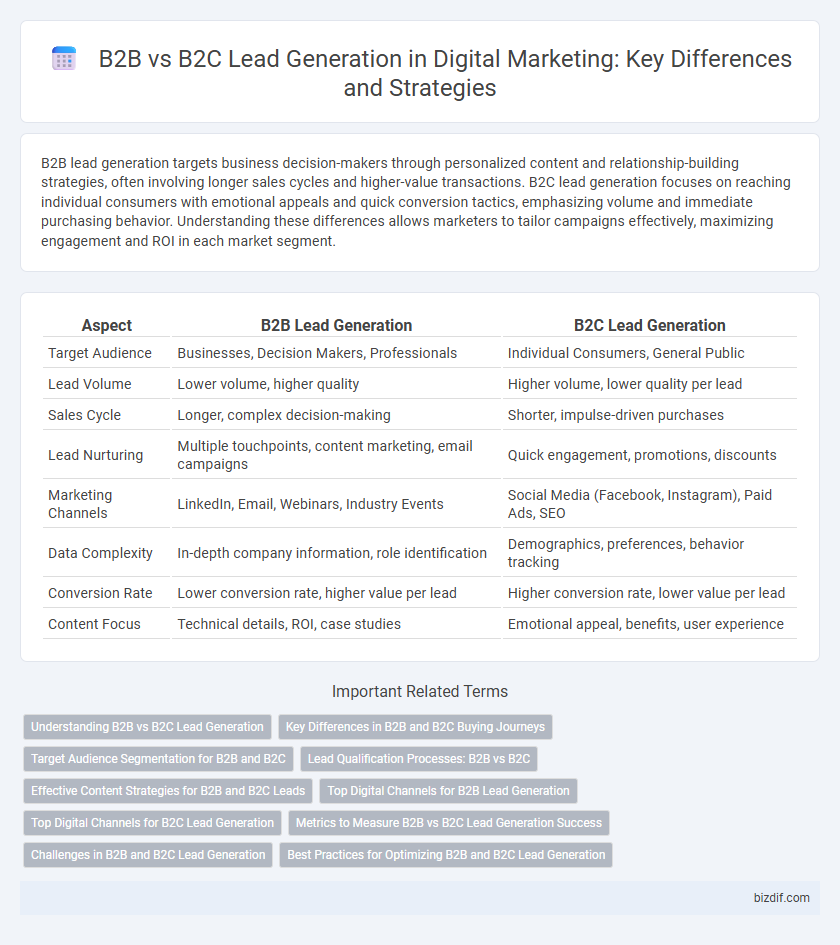B2B lead generation targets business decision-makers through personalized content and relationship-building strategies, often involving longer sales cycles and higher-value transactions. B2C lead generation focuses on reaching individual consumers with emotional appeals and quick conversion tactics, emphasizing volume and immediate purchasing behavior. Understanding these differences allows marketers to tailor campaigns effectively, maximizing engagement and ROI in each market segment.
Table of Comparison
| Aspect | B2B Lead Generation | B2C Lead Generation |
|---|---|---|
| Target Audience | Businesses, Decision Makers, Professionals | Individual Consumers, General Public |
| Lead Volume | Lower volume, higher quality | Higher volume, lower quality per lead |
| Sales Cycle | Longer, complex decision-making | Shorter, impulse-driven purchases |
| Lead Nurturing | Multiple touchpoints, content marketing, email campaigns | Quick engagement, promotions, discounts |
| Marketing Channels | LinkedIn, Email, Webinars, Industry Events | Social Media (Facebook, Instagram), Paid Ads, SEO |
| Data Complexity | In-depth company information, role identification | Demographics, preferences, behavior tracking |
| Conversion Rate | Lower conversion rate, higher value per lead | Higher conversion rate, lower value per lead |
| Content Focus | Technical details, ROI, case studies | Emotional appeal, benefits, user experience |
Understanding B2B vs B2C Lead Generation
B2B lead generation targets businesses and professionals through strategies like LinkedIn outreach, industry webinars, and whitepaper downloads, emphasizing relationship building and long sales cycles. B2C lead generation focuses on individual consumers using social media ads, email campaigns, and discounts to drive quick conversions with shorter sales funnels. Understanding the distinct buyer personas, decision-making processes, and marketing channels is crucial for optimizing lead generation strategies in each segment.
Key Differences in B2B and B2C Buying Journeys
B2B lead generation involves longer, more complex buying journeys with multiple decision-makers and a focus on rational, ROI-driven factors, while B2C lead generation targets shorter, emotion-driven purchasing processes with individual consumers. B2B buyers require extensive research, tailored content, and relationship-building tactics, contrasting with B2C's emphasis on quick conversions and wide-reaching marketing campaigns. Understanding these differences enables marketers to craft precise strategies that address distinct buyer behaviors and needs in each segment.
Target Audience Segmentation for B2B and B2C
Target audience segmentation in B2B lead generation revolves around identifying specific industries, company sizes, and decision-maker roles, enabling personalized outreach to key stakeholders. In contrast, B2C lead generation focuses on consumer demographics, interests, and purchasing behaviors to tailor marketing messages for broader audiences. Employing data-driven segmentation tools enhances targeting accuracy, boosting conversion rates for both B2B and B2C campaigns.
Lead Qualification Processes: B2B vs B2C
B2B lead qualification processes rely heavily on multi-layered criteria such as firmographics, budget, authority, need, and timeline (BANT), emphasizing thorough evaluation to identify decision-makers and ensure alignment with long sales cycles. In contrast, B2C lead qualification often depends on behavioral data, demographic profiling, and engagement metrics to rapidly gauge consumer intent and drive quick conversion. Leveraging CRM and marketing automation tools enhances lead scoring accuracy in both sectors, but B2B demands deeper personalization due to complex buyer journeys.
Effective Content Strategies for B2B and B2C Leads
Effective content strategies for B2B lead generation prioritize in-depth whitepapers, case studies, and webinars that address complex business challenges and demonstrate industry expertise. In contrast, B2C lead generation benefits from visually engaging content, social media campaigns, and promotional offers that appeal to consumer emotions and drive quick decision-making. Tailoring content formats and messaging to the distinct decision-making processes and audience preferences enhances conversion rates in both B2B and B2C marketing efforts.
Top Digital Channels for B2B Lead Generation
Top digital channels for B2B lead generation include LinkedIn, email marketing, and targeted content marketing, which drive high-quality leads through precise audience targeting. LinkedIn leverages professional networks for direct engagement, while email campaigns nurture leads with personalized messages. Content marketing, such as whitepapers and case studies, establishes authority and attracts decision-makers in the B2B space.
Top Digital Channels for B2C Lead Generation
Top digital channels for B2C lead generation include social media platforms like Facebook, Instagram, and TikTok, which drive high engagement through targeted ads and influencer partnerships. Email marketing and search engine optimization (SEO) also play crucial roles in nurturing leads and increasing online visibility. Paid search campaigns on Google Ads further enhance lead acquisition by capturing high-intent consumer queries.
Metrics to Measure B2B vs B2C Lead Generation Success
B2B lead generation metrics prioritize lead quality, conversion rates, and sales cycle length to assess success, emphasizing relationship-building and account-based marketing effectiveness. In contrast, B2C lead generation focuses on volume-driven metrics such as click-through rates, cost per acquisition (CPA), and customer lifetime value (CLV) to maximize revenue from broad audience engagement. Measuring ROI for B2B campaigns often involves tracking multi-touch attribution models and pipeline velocity, whereas B2C success relies heavily on real-time analytics and rapid customer acquisition metrics.
Challenges in B2B and B2C Lead Generation
B2B lead generation faces challenges such as longer sales cycles, the need for personalized content, and complex decision-making processes involving multiple stakeholders. B2C lead generation struggles with high competition, shorter attention spans, and the demand for immediate value or incentives to convert prospects quickly. Both require tailored strategies to effectively capture and nurture leads within their distinct market dynamics.
Best Practices for Optimizing B2B and B2C Lead Generation
Effective B2B lead generation focuses on targeted content marketing, personalized outreach, and leveraging LinkedIn for professional network engagement to nurture highly qualified leads. B2C lead generation optimizes through social media advertising, influencer partnerships, and compelling call-to-action strategies that drive volume and brand awareness. Both require continuous data analysis and A/B testing to refine messaging and improve conversion rates based on buyer behavior insights.
B2B lead generation vs B2C lead generation Infographic

 bizdif.com
bizdif.com